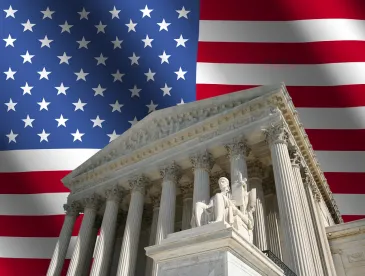The Court returned to action last week, issuing a unanimous decision in one case: Brownback v. King (No. 19-546). It concerns the Federal Tort Claims Act (FTCA), a statute that waives the United States’ sovereign immunity for certain torts committed by federal employees acting within the scope of their employment. One of its provisions, known as the “judgment bar,” prevents a plaintiff from suing a federal employee if a court has already entered judgment against the plaintiff on an FTCA claim arising out of the same subject matter. This prevents plaintiffs from first suing the United States, and then (if not successful) suing the federal employee in their individual capacity. Brownback addressed just what it takes to trigger this judgment bar, particularly how it interacts with dismissals of cases for lack of subject-matter jurisdiction. If that’s piqued your curiosity, read on for more.
Officers Todd Allen and Douglas Brownback were members of a federal task force who mistook James King as a fugitive in Michigan; a violent encounter ensued. King then sued the U.S. under the FTCA, and also brought Bivens claims against Allen and Brownback individually. The defendants moved to dismiss for lack of subject-matter jurisdiction and failure to state a claim, and also moved for summary judgment in the alternative. The district court granted judgment on the FTCA claims, because it found that the officers would be entitled to state qualified immunity under Michigan law had King brought state tort claims (instead of FTCA claims), and because the U.S. retains the benefit of any state-law immunities that are available to its employees. The district court also granted the motion to dismiss for failure to state a claim in the alternative. And it dismissed the Bivens claims, holding that Allen and Brownback were entitled to federal qualified immunity. King appealed only the dismissal of his Bivens claims to the Sixth Circuit.
Before turning to the merits of Allen and Brownback’s immunity, the Sixth Circuit was first faced with the question of whether it could consider the merits at all. The government argued that the judgment in its favor on the FTCA claims (which King had not appealed) triggered the FTCA’s judgment bar, preventing the court from even considering King’s Bivens claims on appeal. But the Sixth Circuit disagreed, concluding that because the district court had dismissed the FTCA claims “for lack of subject matter jurisdiction” when it held that King had not stated a viable claim, it “did not reach the merits” and the judgment bar wasn’t triggered. The Sixth Circuit then reversed the district court on the Bivens claims, holding that Allen and Brownback were not entitled to qualified immunity.
The Supreme Court unanimously reversed, in a decision written by Justice Thomas. He began with some background on the FTCA’s judgment bar, noting that it was drafted against the backdrop of res judicata. Accordingly, the standard for applying res judicata is imported into the judgment bar context: a judicial determination triggers the judgment bar if the decision “actually passes directly on the substance of a particular claim before the court.” The district court decision in King’s case did that: It hinged on “a quintessential merits decision,” namely, whether or not the agents were entitled to qualified immunity. And in any event, the district court dismissed King’s FTCA claims under Rule 12(b)(6) in the alternative, and a decision that the allegations in a complaint do not state a claim necessarily concerns the merits.
The only wrinkle was the fact that the FTCA “involves overlapping questions about sovereign immunity and subject matter jurisdiction.” Somewhat unusually, the FTCA provides that all elements of an FTCA claim are “also jurisdictional.” As a result, the merits and jurisdictional questions become inextricably intertwined. Normally, a court cannot rule on the merits if it lacks jurisdiction. But in FTCA cases, that becomes a chicken-and-egg problem: the district court has to opine on the merits in order to decide whether it had subject-matter jurisdiction in the first place. Hence King’s argument that the judgment bar didn’t apply: The lower courts had dismissed based on lack of subject-matter jurisdiction rather than the merits. But Justice Thomas solved that wrinkle in favor of more sovereign immunity: In the FTCA context, “an on-the-merits judgment can still trigger the judgment bar, even if that determination necessarily deprives the court of subject-matter jurisdiction.”
Justice Sotomayor concurred, hoping to rescue a plaintiff-friendly argument, namely, that the judgment bar may not apply to claims brought in the same suit as FTCA claims. In other words, for Justice Sotomayor, it remains an open question as to whether King might still be allowed to bring his Bivens claims, because they were not brought subsequent to his FTCA claims, but as part of the same suit. Most courts have generally assumed that the judgment bar does preclude other claims brought in the same action alongside FTCA claims. Justice Sotomayor did not actually say she believed otherwise, but she strongly suggested as much, and noted that the question “deserves much closer analysis.”
That’s it for opinions this week. But there was some slightly interesting news on the cert front. One of last term’s blockbusters was Trump v. Mazars USA, LLP, a case addressing New York prosecutors’ efforts to subpoena tax returns and other financial documents from then-President Trump’s companies. As you may recall, the Court rejected Trump’s arguments that he was absolutely immune from the subpoenas, but remanded to the lower courts to analyze whether complying with the subpoena would impair the President’s performance of his official duties. Well, on remand, the district court and the Second Circuit concluded it would not. In October, still-President Trump filed an emergency request with the Supreme Court to stay the ruling while he sought cert. But last week, after an unusually long four-month delay, the Supreme Court denied his request without comment. With his appeals exhausted, news reports indicate that the Trump companies have already turned over some million-odd pages of financial documents. So you may finally get to learn what’s in those tax returns soon.
The Court is scheduled to issue more decisions later this week, and we’ll be back to cover them when it does. Until then.





 />i
/>i
